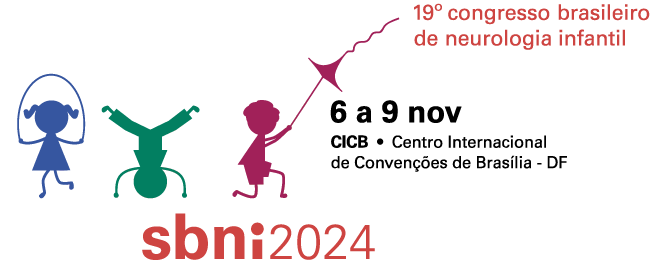Dados do Trabalho
Título
CASE REPORT - PROBABLE CASE OF ROHHAD SYNDROME (OBESITY OF RAPID ONSET WITH HYPOTHALAMIC DYSFUNCTION, HYPOVENTILATION, AUTONOMIC DYSREGULATION) IN A PEDIATRIC WARD IN THE CITY OF SALVADOR-BAHIA
Apresentação do caso único
CASE PRESENTATION: Female child under 3 years and 8 months, admitted to the pediatric ward for investigation of prolonged fever of undetermined origin, associated with rapid weight gain, hyperphagia, hypodipsia, chronic constipation, excessive sweating, and cold extremities. He presented sporadic episodes of loss of sphincter control, a previously acquired developmental milestone. He also had social withdrawal, mood swings, irritability, aggressiveness, dysarthria and nocturnal agitation. Neurological evaluation showed gait instability and slurred speech. Cranial resonance imaging revealed signs of reduced brain volume, with cortical predominance, with no changes in the sella turcica. Screening for infectious diseases was negative. Laboratory abnormalities such as hyperprolactinemia, dyslipidemia with hypertriglyceridemia, hypercholesterolaemia, and hyperglycaemia were present. Thyroid alterations were ruled out. The findings were compatible with ROHHAD syndrome. Follows pediatric multidisciplinary follow-up. Hospital treatment was based on symptoms, with behavioral improvement after the introduction of risperidone and improvement of desaturation episodes after the initiation of ventilatory support with a nasal catheter. She remains in hospital due to his respiratory condition.
Discussão
DISCUSSION: Rohhad syndrome is a rare condition of unknown etiology, characterized by the presence of childhood-onset obesity, alveolar hypoventilation, hypothalamic dysfunction, dysautonomia, hyperphagia, and neurobehavioral disorders. May be associated with central hypothyroidism, electrolyte imbalances, respiratory failure, and endocrinological abnormalities. The prevalence is 1 in 1,000,000. Diagnosis is based on clinical criteria associated with alveolar hypoventilation and at least one sign of hypothalamic dysfunction. It requires a pediatric multidisciplinary team for follow-up, and treatment is symptom-based. The prognosis is variable and depends on early diagnosis, and the later it is, the greater the risk of negative outcomes, especially respiratory causes.
Comentários finais
FINAL CONSIDERATIONS: Although rare, the early diagnosis of Rohhad Syndrome can increase the life expectancy of affected children, since there is still no specific treatment for the syndrome.
Referências
Weese-Mayer DE, Marazita ML, Rand CM, et al. Congenital Central Hypoventilation Syndrome. In: GeneReviews [Internet], Adam MP, Ardinger HH, Pagon RA, et al (Eds), University of Washington, Seattle 1993-2020. Available at: https://www.ncbi.nlm.nih.gov/books/NBK1427/ (Accessed on October 13, 2020)
Congenital Central Hypoventilation Syndrome (CCHS) Panel. Available at: https://www.ncbi.nlm.nih.gov/gtr/tests/515546/overview/ (Accessed on October 13, 2020
Palavras Chave
ROHHAD; HYPOTHALAMIC DYSFUNCTION; NEUROBEHAVIORAL;
Área
Manifestações neurológicas das doenças sistêmicas
Autores
CAROLINA FARIAS PIRAJA, MARIA FONSECA SOARES FERREIRA, GABRIELA RIBEIRO PORTUGAL, TAILANE CRISTINA DE SOUZA, EMMANUELLE SOUZA VASCONCELOS, CAROLINA GODOY
